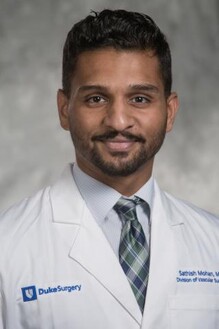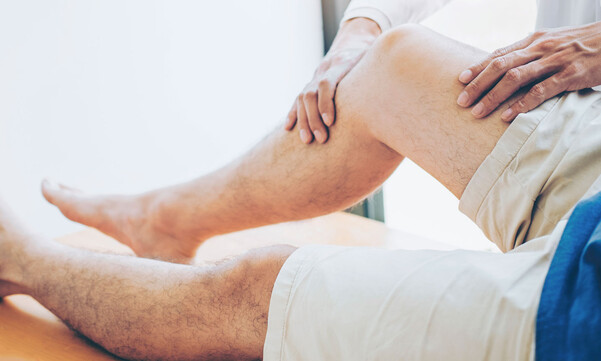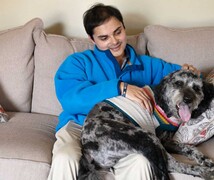Si las piernas se sienten pesadas de forma habitual, especialmente después de estar en una misma posición durante mucho tiempo, el causante puede sorprenderle. Según el especialista en cirugía vascular de Duke Health Sathish Mohan, MD, las venas varicosas son una causa común. "La mayoría de las personas piensa que venas varicosas son solo un problema estético, pero esta afección puede progresar y causar incomodidad significativa, incluida la sensación de que las piernas están hechas de plomo", comentó el Dr. Mohan. La buena noticia es que hay acciones que podemos llevar a cabo para ayudar.
Las venas varicosas son un tipo de enfermedad venosa.
Las venas varicosas son un tipo de enfermedad venosa: cuando la sangre fluye hacia atrás o se acumula, generalmente en las piernas y los pies, debido a venas débiles o dañadas. (La enfermedad venosa es diferente de la enfermedad vascular, que incluye problemas con venas y arterias).
En algunas personas, las venas varicosas pueden presentarse como venas varicosas inofensivas, vasos sanguíneos delgados cerca de la superficie de la piel que pueden verse azules, rojos o morados, o progresar a problemas de circulación más graves, como venas abultadas, hinchazón de las piernas y úlceras en la piel que pueden poner en peligro las extremidades o incluso la vida.
¿Qué tipos de médicos tratan la enfermedad venosa?
Los cirujanos vasculares como Dr. Mohan y los asistentes médicos o profesionales en enfermería que se especializan en el cuidado de las venas son los expertos en venas varicosas y otros tipos de enfermedades venosas.
"Ver a un cirujano no significa que uno esté destinado a cirugía", dijo el Dr. Mohan, quien enfatizó que tratamientos conservadores, como prendas de compresión y cambios en el estilo de vida, pueden ser todo lo que se necesita. Para personas que no han visto mejoría con esas opciones, la cirugía puede ser increíblemente efectiva.
Las opciones de cirugía varían desde procedimientos de ablación mínimamente invasivos e inyecciones que ayudan a mejorar el flujo sanguíneo hasta cirugía más invasiva para eliminar venas problemáticas.
¿Cuándo debo consultar a un médico vascular por piernas pesadas?
Si está indeciso sobre si consultar a un médico vascular, el Dr. Mohan sugiere preguntarse lo siguiente: "¿Se siente significativamente limitado a diario debido a sus síntomas?? Si la respuesta es sí, es momento de programar una cita. Espere dedicar tiempo a conversar con su proveedor sobre sus síntomas y aprender sobre las opciones de tratamiento para que pueda tomar una decisión informada. Mientras tanto, no está de más comenzar a usar medias de compresión, comentó el Dr. Mohan.
Busque atención en un Centro Vascular con experiencia.
Los médicos vasculares de Duke Health tratan de manera rutinaria casos de enfermedad venosa que van desde los más comunes hasta los más complejos. Cuando es necesario, colaboramos con otros especialistas para ofrecer atención integral. Esto puede incluir cardiólogos, especialistas en cuidado de heridas, terapeutas físicos y otros.
"Nuestro objetivo es mejorar la calidad de vida", dijo el Dr. Mohan. Es increíblemente gratificante ayudar a pacientes a pasar de no poder desempeñar su trabajo adecuadamente debido a su condición a atender sus síntomas y mejorar realmente su día a día.





